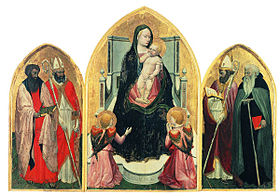
Back جوفينال نارنى ARZ Juvenal de Narni Catalan Juvenal z Narni Czech Juvenal von Narni German Juvenal de Narni Spanish Juvenal de Narni French Giovenale di Narni Italian Juwenalis z Narni Polish Иувеналий Нарнийский Russian Jovenale wa Narni Swahili
Saint Juvenal of Narni | |
|---|---|
 The San Giovenale Triptych The right panel depicts St. Anthony and St. Juvenal. [Masaccio Museum of Sacred Art, Cascia di Reggello (Florence, Italy)]. | |
| Bishop and Confessor | |
| Died | May 3, 369 or 377 Narni, Umbria, Italy |
| Venerated in | Roman Catholic Church Eastern Orthodox Church[1] |
| Major shrine | cathedral of Narni |
| Feast | May 3 |
| Attributes | Holding a sword in his mouth; holding a chalice[2] |
| Patronage | Narni; Fossano |
Saint Juvenal (d. May 3, 369 or 377) (Italian: San Giovenale di Narni) is venerated as the first Bishop of Narni in Umbria. Historical details regarding Juvenal's life are limited. A biography of Juvenal of little historical value, written after the seventh century, states that Juvenal was born in Africa, was ordained by Pope Damasus I, was the first bishop of Narni, and was buried in the Porta Superiore on the Via Flaminia on August 7, though his feast day was celebrated on May 3.[3] This Vita does not call him a martyr but calls him a confessor.[3] The martyrologies of Florus of Lyon and Ado describe Juvenal as a bishop and confessor rather than as a martyr.[3]
Saint Gregory the Great, in his Dialogues (IV, 12) and Homiliae in Evangelium, speaks of a bishop of Narni named Juvenal, and describes him as a martyr.[3] The title of martyr, though, was sometimes given to bishops who did not necessarily die for their faith.[3] Gregory also mentions a sepulcher associated with Juvenal at Narni.[3]
- ^ (in Greek) Ὁ Ἅγιος Ἰουβενάλιος Ἐπίσκοπος Ναρνί. 3 Μαΐου. ΜΕΓΑΣ ΣΥΝΑΞΑΡΙΣΤΗΣ.
- ^ Saint of the Day, May 3: Juvenal of Narni SaintPatrickDC.org. Retrieved March 6, 2012.
- ^ a b c d e f Caraffa, Filippo (22 June 2002). "San Giovanale di Narni". Santi e Beati. Retrieved August 10, 2008.